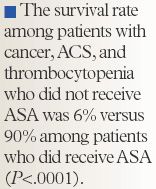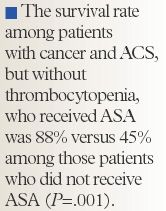- Safety & Recalls
- Regulatory Updates
- Drug Coverage
- COPD
- Cardiovascular
- Obstetrics-Gynecology & Women's Health
- Ophthalmology
- Clinical Pharmacology
- Pediatrics
- Urology
- Pharmacy
- Idiopathic Pulmonary Fibrosis
- Diabetes and Endocrinology
- Allergy, Immunology, and ENT
- Musculoskeletal/Rheumatology
- Respiratory
- Psychiatry and Behavioral Health
- Dermatology
- Oncology
Patients with cancer and ACS, with or without thrombocytopenia, may benefit from use of aspirin
In a small, retrospective, case-control study, it was demonstrated that aspirin (ASA) improved 7-day survival in patients with cancer who developed acute coronary syndrome (ACS), with or without thrombocytopenia.

Key Points
In a small, retrospective, case-control study published in the journal Cancer, it was demonstrated that aspirin (ASA) improved 7-day survival in patients with cancer who developed acute coronary syndrome (ACS), with or without thrombocytopenia. The improvement was not associated with a significant increase in complications from bleeding.

This study included 70 patients who were admitted to the MD Anderson Cancer Center with a diagnosis of ACS. The patients were split into 2 groups: those with normal platelet counts (n=43) and those with thrombocytopenia (n=27).
Investigators collected data on a number of demographic and treatment characteristics including but not limited to the use of ASA, beta-blockers, and blood transfusions; cancer diagnosis; severity of ACS; and risk factors for coronary artery disease such as diabetes, smoking history, and hypertension.
Multivariate logistic regression identified the following as independent risk factors for death during the 7 days following ACS: a lack of ASA use (adjusted OR=18.44; 95% CI, 2.87–118.60; P=.002), lack of beta-blocker use (adjusted OR=31.65; 95% CI, 2.80–357.45; P=.005), ST-segment elevation (adjusted OR=17.24; 95% CI, 1.84–161.67; P=.013), and use of blood transfusions (adjusted OR=12.06; 95% CI, 1.03–141.14; P=.05).

The authors stated: "On the basis of this study, clinicians should consider using ASA in cancer patients with ACS and thrombocytopenia. However, in every case, the risk should be weighed against the benefit, because, despite the low incidence of bleeding complication in our study, the potential for bleeding in patients with thrombocytopenia is high."
Thrombocytopenia is a common complication of both the disease process and treatment of cancer, occurring in approximately 10% of patients. Similarly, approximately 15% of cancer patients have thrombotic complications, some of which may manifest as ACS. Currently, no consensus guidelines or recommendations exist for treating ACS in patients with cancer, with or without thrombocytopenia.
SOURCES
Sarkiss MG, Yusuf SW, Warneke CL, et al. Impact of aspirin therapy in cancer patients with thrombocytopenia and acute coronary syndromes. Cancer. 2007;109:621–627.
Braunwald E, Antman EM, Beasley JW, et al. ACC/AHA 2002 guideline update for the management of patients with unstable angina and non-ST-segment elevation myocardial infarction-summary article: A report of the American College of Cardiology/American Heart Association task force on practice guidelines (Committee on the Management of Patients With Unstable Angina). J Am Coll Cardiol. 2002;40:1366–1374.
FDA Approves Combination Therapy for Pulmonary Arterial Hypertension
March 25th 2024J&J’s Opsynvi is single-tablet combination of macitentan, an endothelin receptor antagonist, and tadalafil, a PDE5 inhibitor. It will be priced on parity with Opsumit, which is also a J&J product to treat patients with PAH.
FDA Issues Complete Response Letter for Onpattro in Heart Failure Indication
October 9th 2023Alnylam Pharmaceuticals will no longer pursue this indication of Onpattro and will instead on focus on a label expansion for Amvuttra, which is in phase 3 development to treat patients with cardiomyopathy of ATTR amyloidosis.
